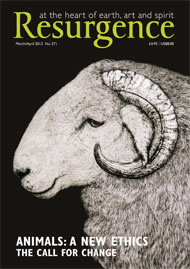Greed is out, empathy is in.” These, the very first words of Frans de Waal’s latest book, The Age of Empathy: Nature’s Lessons for a Kinder Society, are startling in their simplicity, hope and, some might say, naivety. Writing soon after the start of the global financial crisis in 2008 and the election of Barack Obama following the presidential candidate’s ‘We can’ campaign, de Waal is optimistic as he claims, “Empathy is the grand theme of our time.”
The author sees a seismic shift from the era of huge corporate and individual risk-taking (with no concern for the effect on the majority of ordinary citizens in society) to a time that stresses cooperation and social responsibility. He states that no one any longer believes that a free market is wonderful at self-regulation, and throws down the challenge that a different understanding of human nature and biology – which so often is used to justify selfish behaviour – will offer a giant helping hand towards this shift to a new epoch.
In 2012 the crisis is still very much with us: European leaders struggle to avert national bankruptcies, world markets continue to fluctuate wildly, and all within the same system that produced the financial earthquakes in the first place. Perhaps I am too impatient. We hear little mention of alternatives such as the micro-banking schemes that some news media flagged up four years ago, and the mainstream political parties offer no radical new structures; but demonstrations and sit-ins such as the Occupy protests in Washington and London have been attracting attention, even if much goes unreported elsewhere.
Both Warren Buffett and Bill Gates speak of an ethical duty to redistribute great wealth, while the director of a marketing company has no hubris in saying that his millionaire salary is at the low end of the scale. There is debate, but no seismic shift – at least not yet.
Of course, this is not de Waal’s fault: he simply wants to show us that there is hope in our evolutionary heritage; that we should not give up on human nature and the problems of society because of some biological imperative that makes our selfish behaviour inevitable. Quite the opposite – our very success as a species, over the long term, is due to our extraordinary ability to cooperate and empathise.
De Waal looks to our closest relatives, the non-human primates, for evidence of these traits as part of our evolution. He has done this in many of his books, and indeed much of the evidence he cites here has appeared in his previous writings. What is different in this book is that he explains in greater depth how empathetic behaviour is not a recent, easily shed virtue, but an ancient part of our biology, whose beginnings can be traced far further back in evolutionary time than to just our primate cousins. Fundamental to this is his ‘Russian doll’ model, illustrating empathy as multilayered.
As a primatologist at the Wild Futures Monkey Sanctuary, I find the background material in The Age of Empathy fascinating. The majority of monkeys at the sanctuary have been rescued from lives of trauma and social and physical deprivation. The symptoms they display are similar to those of the psychological pathology in humans who have suffered similar deprivation. The monkeys may rock back and forth, pace or show other repetitive stereotypic behaviours. They may self-harm, comfort-eat, or react inappropriately to social approaches by others.
De Waal describes the near-catatonic state of the Romanian orphans who had fallen victim to an ideological experiment, and we are reminded of the ex-pet monkeys whose behaviour practically mirrors that of the children. What makes our work at the sanctuary so rewarding is that with time, care and, essentially, the company of primates of their own kind, so many damaged individuals do make a considerable recovery. When given the opportunity, these primates are able to recover their innate empathy, to receive comfort and to heal each other.
The evidence de Waal collates is well written and accessible to the general reader, without being patronising. He is a gifted communicator, yet somehow this book also disappoints. What de Waal promises in his introduction is a political critique. But if his aim is to explore the philosophical and political implications of the biological evidence, then although he recalls how behaviour that is accepted and indeed encouraged in the marketplace is not healthy or normal, but pathological, he does not give alternative structures that could explain how we can exploit our better nature for society’s good.






